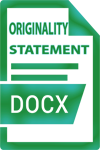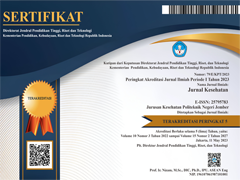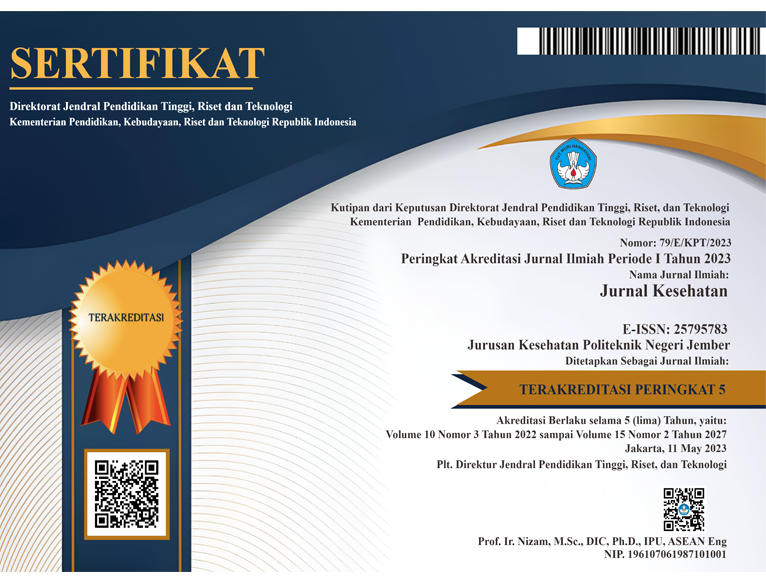Publications Ethics
Jurnal Kesehatan uses guidelines issued by the Committee on Publication Ethics (Commission of Publication Ethics/COPE) in all aspects of publication ethics, in particular, protocols of research and publication.
ETHICS FOR AUTHORS
- Writing Standards:
Authors of reports of original research should present an accurate account of the work performed as well as an objective discussion of its significance. Underlying data should be represented accurately in the paper. A paper should contain sufficient detail and references to permit others to replicate the work. Inaccurate statements constitute unethical behaviour and are unacceptable
- Originality and Plagiarism:
Plagiarism is unethical behavior in the publication of scientific papers and cannot be accepted. The authors should ensure that they have written entirely original works, and if the authors have used the work and/or words of others that this has been appropriately cited or quoted. The statement of the originality of the article form can be downloaded here template J-Kes.
- Multiple, Redundant, or Concurrent Publications:
An author should not in general publish manuscripts describing essentially the same research in more than one journal or primary publication. Submitting the same manuscript to more than one journal concurrently constitutes unethical publishing behaviour and is unacceptable.
- Acknowledgement of Sources:
Proper acknowledgment of the work of others must always be given. Authors should cite publications that have been influential in determining the nature of the reported work. Information obtained privately, such as conversations, correspondence, or discussions with third parties, may not be used or reported without the written permission of the source of the information.
- Authorship of the Paper:
Authorship should be limited to those who have made a significant contribution to the conception, design, execution, or interpretation of the reported study. All those who have made significant contributions should be listed as co-authors. Where there are others who have participated in certain substantive aspects of the research project, they should be acknowledged or listed as contributors. The corresponding author should ensure that all appropriate co-authors and no inappropriate co-authors are included on the paper, and that all co-authors have seen and approved the final version of the paper. If the article was jointly prepared by more than one author, any authors submitting the manuscript warrants that he/she has been authorized by all co-authors to be agreed on this copyright and license notice (agreement) on their behalf, and agrees to inform his/her co-authors of the terms of this policy. Jurnal Kesehatan will not be held liable for anything that may arise due to the author(s) internal dispute. Jurnal Kesehatan will only communicate with the corresponding author.
- Disclosure and Conflicts of Interest:
All authors should disclose in their manuscript any financial or other substantive conflict of interest that might be construed to influence the results or interpretation of their manuscript. All sources of financial support for the project should be disclosed.
- Data sharing dan Reproducibility:
Jurnal Kesehatan permits users to copy, distribute, display, and perform the work for non-commercial purposes only. Users will also need to attribute authors and Register on distributing works in the journal and other media of publications. Unless otherwise stated, the authors are public entities as soon as their articles got published.
- Correction and Retraction of Published Article:
The author should notify us as soon as possible if they find errors in their published article, especially errors that could affect the interpretation of data or reliability of information presented. It is the responsibility of the corresponding author to notify the journal editor to retract or correct the article, immediately. If the editor receives information from a third party that a published work contains significant errors, it is the author's responsibility to immediately withdraw or make corrections or provide evidence to the editor regarding the accuracy of the original writing.
ETHICS FOR EDITOR
- Publication Decision
The editor has the authority to select and decide the articles to be published. Decisions are made based on the level of article contributions and recommendations from reviewers. Editors carry out their duties in accordance with the policies of the journal Manager and comply with applicable legal provisions such as defamation, copyright infringement, and plagiarism.
- Objective Assessment
The editor evaluates a manuscript based on its intellectual content without discrimination in religion, ethnicity, ethnicity, gender, nation, and others.
- Confidentiality
Editors and editorial staff may not disclose any information about accepted manuscripts to anyone other than the authors, reviewers, prospective reviewers, and the editorial board.
- Disclosure and Conflict of Interest
Article material that has been submitted to the Jurnal Kesehatan and has not been found may not be used for the editor's personal research without the permission of the author. Information or ideas obtained through blind review must be kept confidential and not used for personal gain. Editors must refuse to review a manuscript if the editor has an interest in the manuscript, due to a competitive, collaborative, or other relationship with the author, company, or institution with which it relates.
- Review of Manuscripts
Editor must ensure that each manuscript is initially evaluated by the editor for originality, scope and conformity template (Pre-Review Process). The editor should organize and use peer review fairly and wisely. Editors should explain their peer review processes in the information for authors and also indicate which parts of the journal are peer reviewed. Editor should use appropriate peer reviewers for papers that are considered for publication by selecting people with sufficient expertise and avoiding those with conflicts of interest.
- Cooperation in Investigation:
Editors must take responsive steps if there are complaints related to ethics in the manuscripts that have been received or in articles that have been published. The editor can contact the scriptwriter and provide consideration for the complaint. Editors can also communicate further to related research institutions or institutions. Once the complaint has been resolved, matters such as publication of corrections, withdrawals, statements of concern, or other notes, need to be considered.
ETHICS FOR REVIEWERS
- Contribution to Editorial Decisions
Peer review assists the editor in making editorial decisions and through the editorial communications with the author may also assist the author in improving the paper.
- Timeliness
If an assigned reviewer feels unqualified to review a manuscript or finds that it is not possible to conduct a proper review, the assigned reviewer should immediately contact the editor.
- Confidentiality
Any manuscript that has been accepted for review must be treated as a confidential document. The manuscript may not be shown to or discussed with others unless it has been authorized by the editor.
- Standards of Objective
The review must be carried out objectively. Personal criticism of the author is inappropriate. The reviewer must clearly state his views with supporting arguments.
- Completeness and Authenticity of References
Reviewers must identify published works that have not been cited by the authors. A statement about previous observations must be accompanied by relevant citations. The reviewer must point out to the editor any substantial similarities or overlaps between the manuscript under review and the evidence attested, according to the reviewer.
- Disclosure and Conflict of Interest
Privileged information or ideas obtained through peer review must be kept confidential and not used for personal advantage. Reviewers should not consider manuscripts in which they have conflicts of interest resulting from competitive, collaborative, or other relationships or connections with any of the authors, companies, or institutions connected to the papers.













